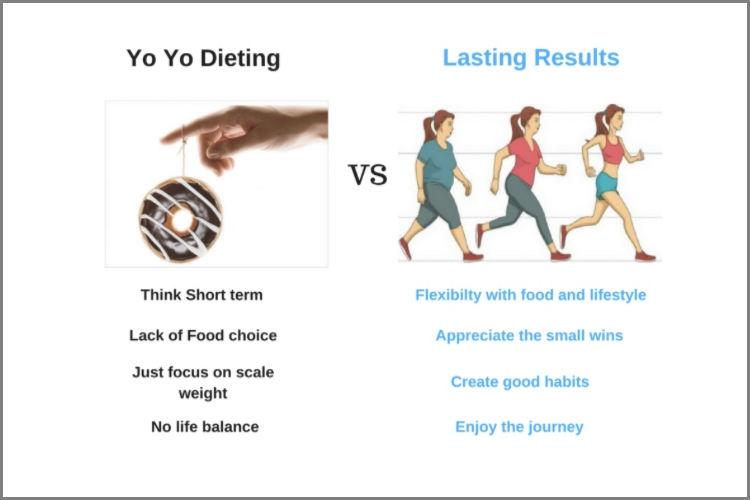Why Do Most Obese People Regain Weight After Losing It?
Reasons Of Regain Of Weight After Weight Loss!
Most obese people who lose some weight regain it after a while. In fact, most regain more weight than they lose under most treatments.
Why does this happen?
This happens because most people lose weight on unscientific treatments based on nutritionally wrong, starvation-based diets or mindless and injurious over-exercise, mostly strength training or excessive floor exercise, often accompanied by proteins supplements.
All such slimming programs are run with a ‘gun to the temple’ attitude or like a Nazi Concentration Camp-like process.
While most such programs attract the gullible obese people with the promise of effortless weight loss, in reality, the programs turn out to be exactly the opposite.
No one really enjoys such programs.
And these people know that people won’t follow them unless they are put under extreme psychological pressure and they won’t even get temporary results.
And they can’t afford to have most people failing to deliver even temporary results.
Their only concern is to show some results, even if temporary, while the people are under their programs.
Making people slim and healthy for a lifetime is neither their goal nor do they know how to do it.
They either do not realize that their programs are destroying people’s health or they don’t care if it happens.
But few can sustain starvation-based diets or painful exercises too long.
They give up such treatments sooner or later and then they soon regain more weight than they had lost.
Let us see what happens on starvation.
1. Starvation forces the body to lose glycogen (carbohydrate stored in our liver and muscles), water, and proteins (from the connective tissue, muscles, and organs). What you lose on the scale is largely contributed by the above three and only a little by fat. The result is you become wrinkled, shrivelled, and dehydrated, without really looking appreciably slimmer.
2. You suffer from multiple nutritional deficiencies (of calories, carbohydrates, proteins, fats, vitamins, and minerals). You become weak, wrinkled, pale, anemic, and unfit and generally feel unwell. The initial false sense of weight loss encourages you to carry on starvation for some more time causing more deficiencies.
Apart from anemia, there will be a loss of body proteins (this causes wrinkling and sagging of skin, which is a constant feature of starvation-based slimming programs) and deficiency of most micronutrients.
Calcium loss is common. It can lead to dental caries, bone pains, pain in the neck and back, and even osteoporosis.
Constipation, fissures, and haemorrhoids (or piles) are also common.
Hyperacidity, severe digestive tract disorders including ulcers, colitis, and mal-absorption syndromes are common side effects of sustained starvation. There will be colic (pain) in the abdomen, inability to digest and absorb food properly, gases, and loose of motion. Digestive tract disorders are often not totally curable and can become a lifetime disability.
One more common complication of starvation level diets, especially when people are put on liquids-only diets, is the development of cholecystitis, inflammation of the gall bladder, and formation of gall stones. This can lead to grave complications.
3. Your body lowers its metabolic rate. This means it burns fewer calories every day than it did before. This leads to a faster regain of weight when you start eating normal food. Plus your body regains all the lost glycogen, water, and proteins. All three are essential components of your body. Thus there is more weight gain. You are inevitably fatter than before.
Such yo-yo slimming is potentially more dangerous than staying obese, for one more reason. Each time you gain weight, your blood pressure, triglycerides, cholesterol, and blood sugar may go up. They do not necessarily come down to the normal levels each time you lose some weight. Thus these levels can steadily keep going up as you keep gaining and losing weight repeatedly. Your risk of developing coronary heart disease, cerebral strokes (attacks of paralysis), and diabetes increase greatly.
Mindless exercise can cause serious injuries, often crippling people.
What is the right way to lose weight?
If you truly wish to get slim and healthy for a lifetime, you have to make small but significant changes in your food and lifestyle and maintain them for a lifetime, and you can easily do this!
You must unequivocally accept that there are no magic treatments in this world that can make you slim and healthy for a lifetime!
For more information read the articles ‘Dangers Of Unscientific Treatments’ and ‘Simple Steps To Slimming’ on this website.

















Leave a Reply